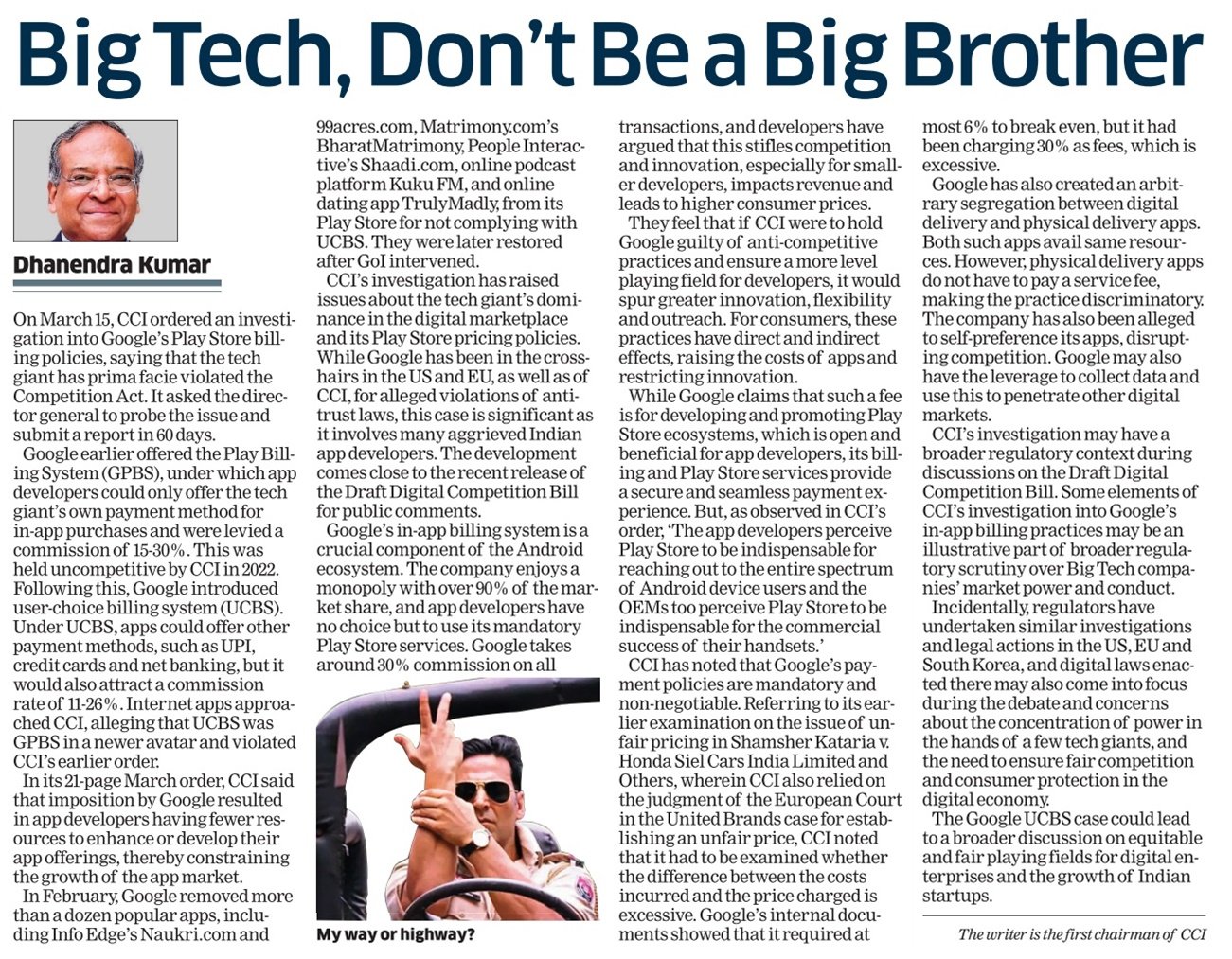To: editet@timesgroup.com
Subject: Big Tech, Don’t Be A Big Brother
Dear Editor of Economic Times:
This has reference to the op-ed entitled Big Tech, Don’t Be A Big Brother by Dhanendra Kumar, Former Chairman, Competition Commission of India (CCI), in The Economic Times.
This article is full of factual and logical inaccuracies. Let me list some of them below.
Whither monopoly?
My Samsung Galaxy smartphone came preinstalled with Samsung App Store and Google Play Store. There are over five Android App Stores from Oppo, Vivo, et al that are preinstalled in their respective handset manufacturer’s phones. Ergo, app store market has more than one supplier, and Google Play Store cannot be termed a monopoly according to the legal definition of the term (“only one supplier in a related market”).
If Play Store has a dominant market share, that’s because app developers took the conscious decision to overwhelmingly list their apps on Play Store instead of the other app stores (for reasons that will become clear in a bit). In other words, Play Store didn’t become dominant by government edict. So the charge of monopoly shouldn’t stick.
But, if the regulator becomes overzealous and levels such a charge, Google should have every right – even obligation? – to reduce its overwhelmingly high market share. The most obvious way to do that is to jettison customers. When Google tried to do exactly that by delisting nine leading apps, neither the app developers nor Government of India accepted that solution.
As an aside, to prevent abuse of antitrust laws, there should be a difference between a monopoly created by government decree (e.g. MSEB, PG&E) versus dominance achieved by overwhelming customer preference (e.g. ?).
Why price control?
In the aftermath of liberalization of 1991 in India, there are no price controls on food, clothing, housing, school fees, and other basic necessities. Accordingly, I see no logic for India to impose price control for an Android app store, however dominant it is.
Digital colony BS
Indian Tech Bros built the 101st payment app on top of OS, RDBMS, Programming Language, SSL, TLD, and DNS, owned by American companies, and freeloaded on hosting, marketing and distribution provided by American companies. Then claimed that they created the Digital Economy. While they might be able to con gullible sheep into believing anything they say by pulling the nationalistic card, the Apples and Googles didn’t become GOAT by getting suckered by freeloaders. Some day they were bound to tell these Tech Bros that it’s their Digital Economy and Tech Bros are merely tenants.
That day has come and the bill is due.
Tech Bro doesn't understand that all B2B deals are confidential and can jolly well have different terms. Anyone who doesn't understand Business 101 is ngmi. Delete their apps right now.
Google Play Store. https://t.co/aIj1Ib5XZe— Ketharaman Swaminathan (@s_ketharaman) March 2, 2024
If Tech Bros think they can avoid paying the bill by running to the government, they should find out what regulators did to stop alleged price gouging by schools, colleges, hospitals, food delivery apps, airport restaurants, and other Indian companies.
On a side note, if only tech bros had spent less time tweeting about India Stack, Aadhaar and UPI, and spent more time building something foundational, Bharat AppStore might have been a reality by now and they wouldn’t be having their b@lls squeezed by Google Play Store now.
Yesterday, re. Google Play Store delisting, Tech Bros were all, oh govt. please intervene.
Today, re. AI type approval, Tech Bros are all, oh govt. please don't intervene.
I don't recall the last time I witnessed such a dramatic U-turn in less than 24 hours!
Interesting times!— Ketharaman Swaminathan (@s_ketharaman) March 4, 2024
Economic value
I’m told that the Indian anti-competition law permits price control on the basis of Economic Value.
Does Play Store have economic value?
The answer to that question becomes a no-brainer once you read the following lines in the aforementioned article:
- “App developers perceive Play Store to be indispensable”.
- “OEMs too perceive Play Store to be indispensable for the commercial success of their handsets”.
They clearly signify that Google Play Store has overwhelming economic value! Google should be allowed to charge 26% or 52% or whatever for delivering that economic value. Regulatory should lay off. Period.
But does it? No, the regulator references data around 6% breakeven point from EU documents, and thereby shifts the goal post to cost-plus, which is incompatible with economic value, the only provision allowed under Indian laws for price control.
While on the subject, Google’s rake is not even the highest in the industry!
@GTM360: If you thought Google Play Store’s 30% rake is exorbitant, think again. Here’s the going rate in other industries:
– Rideshare / Uber: 20%.
– Food Delivery / Swiggy
– Ecommerce / Amazon: 25%
– Quick Commerce / Zepto: 30-45%.
– IT Reseller: 35%.
Unsolicited $0.02 for Tech Bros
App developers should not forget the wise words of a US fintech founder:
“When billionaire companies fight about who gets richer, it’s usually the little guy that loses” ~ Kingsley Ezeani.
CashEx Founder CEO totally gets why small app developers will get burned in the fight between Google Play Store and Large App Developers, and highlights several advantages for app developers of Google Play Store’s dominance in the Android app store space e.g. Huge global audience via single app, lower costs of listing and selling on a single venue, etc. – which were among the ones I’d described in a previous post titled Economic Times Publishes My Take On Play Store v. App Developers Controversy.
When this Play Store fracas started three years ago, hundreds of app developers complained. Only nine apps were delisted recently. This suggests that the other apps have found a way to accept Google TOS and move on. Seems these nine Tech Bros thought they could blackmail Google but instead Google called their bluff.
If and when Oracle turns the screw on OCI pricing, Tech Bros will realize ONDC – DPI is not the solution, either. https://t.co/Xbnh2Q5CMP
— Ketharaman Swaminathan (@s_ketharaman) March 1, 2024
Unsolicited $0.02 for Regulators
Before piling on to Google, the Indian regulator should not forget that India contributes less than 2% to Google’s global revenues whereas Google’s investments in India contribute to more than 2% of India’s FDI. Should anybody have any doubt that Google can exit India if it chooses to, let me recount the number of times that Silicon Valley Big Tech companies have threatened to exit / actually exited many markets e.g.
- Google and Facebook pulled the news feature from their respective apps from Canada
- Meta didn’t launch Threads in EU
- Big Tech refused to comply with India’s diktat that all personal data of Indians must stay in India
- Visa / MasterCard declined Reg ZeroMDR regime for their credit card and debit card in India
- WhatsApp told the Delhi High Court that it would exit India if it’s forced to stop encrypting its messages.
Where @economictimes misses a basic tenet of global capitalism that a foreign pvt sector company can jolly well give more benefits to its users than a country provides to its citizens and exit the country if its govt curbs its right to do so. pic.twitter.com/Lp258SmUci
— Ketharaman Swaminathan (@s_ketharaman) May 1, 2024
Indian government did not ban Big Tech or Visa / MasterCard or WhatsApp. It won’t ban Google Play Store either.
Moral of story: Small Brother should stay in his lane and stop pretending to be Big Brother!
Thanks and Regards.
KETHARAMAN SWAMINATHAN
21 March 2024
In case the op-ed referenced above is not available online or is paywalled, cf. following exhibit.


